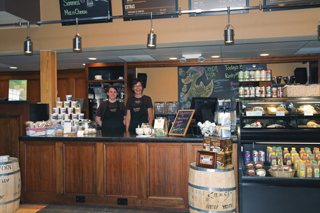

Crafty bean scene
Laura Cook Newman //August 1, 2014//
 To die-hards, the black-velvet and rich fragrance is more than buzz-worthy – its a recharging refreshment with $30 billion in annual U.S. sales attesting to its eye-opening appeal.
To die-hards, the black-velvet and rich fragrance is more than buzz-worthy – its a recharging refreshment with $30 billion in annual U.S. sales attesting to its eye-opening appeal.
Shop-by-shop, roaster-by-roaster, Colorado is earning its star on the coffee-lover’s map. What’s making this emerging coffee scene unique?
People
“The unique thing about the craft of coffee is that at every level, the human element is key,” said Philip Goodlaxson, roastmaster at Corvus Coffee Roasters in Denver. “From sourcing coffees, which builds relationships with farmers who care deeply about their craft, to using senses: taste, sight, smell, when roasting the bean. Coffee is a socially impactful craft.”
Similarly, brothers Tommy and Tim Thwaites of Coda Coffee Co. – named “2014 Roaster of the Year” by Roast Magazine – owe much of their success to people. And not just the 45 employees at their Denver location, but also the team of global farmers they work with to ensure that every element of the supply chain is safe and sustainable.
The siblings grew up in the Seattle coffee scene. Coda earned a coveted B Corporation certification for working to enrich shareholders and the planet simultaneously. These self-titled “worldly do-gooders” are also in development to use a waste product (chicken manure) to create rich fertilizer for South American coffee farmers.
The Thwaites brothers’ passion for their brand and mission is contagious. Older brother Tommy emphasizes: “We are big believers that if you enjoy what you do, work is a lot easier.” That sentiment and bottomless “friggin’ awesome” coffee are attributes that draw quality employees to Coda.
Micro
Smaller operations that roast less than 100,000 pounds of beans annually are considered “micro roasters.” Novo Coffee, founded in 2002, is one of the veteran micro roasters making mega waves. The family business operates two antique roasters out of a nondescript warehouse a few blocks from Coors Field. Last year, it expanded consumer reach by opening two hipster-magnet coffee shops in Denver.
The demand for higher quality coffee coupled with relatively low startup costs minimizes the barriers to entering this growing industry. “It seems like every day we’re reading about a new roasting company opening or an existing one expanding,” said Novo co-founder Jake Brodsky. “Competition has definitely increased, but so has the size of the market as restaurateurs, chefs, baristas and end-consumers are demanding better tasting, more traceable coffee.”
The business of craft coffee has similarities to the local craft beer movement, Brodsky added, suggesting an inevitable saturation point.
Maintaining the “small-guy” status allows for experimentation that makes micro roasters more agile than their macro counterparts. For example, Novo partnered with local breweries Epic Brewing Co. and New Belgium Brewing to make coffee-infused beers, blending two popular crafts together.
Macro
Allegro, founded in Boulder in 1977, was one of Colorado’s first specialty coffee companies. Today it is the sole roaster for Whole Foods, nationally packaging both its Allegro brand as well as its private label, 365.
Allegro continues to diversify with its recent purchase of a hot spring in Idaho to produce a line of bottled spring water.
“It’s amazing,” said Heather Zapletal, Allegro’s director of sales, when asked about Colorado’s rapidly growing micro roaster scene. “We’re all in it together to educate the consumer to trade up to a better product, while helping the farmers grow quality beans.”
Altitude
Mark Goodman of Boyer’s Coffee says his product appeals to the “solid middle,” as the company seeks to serve a great cup of coffee without the pretense. Since 1965, Boyer’s has been serving consumers with coffee beans roasted in its 1944 “Old Betty” roaster. Tradition is palpable in the company’s 1927 schoolhouse-turned-café in Denver; the company is also poised to open a second retail spot in the Denver Tech Center this summer.
Goodman explained that housing and roasting beans in Colorado’s arid climate does wonders for the quality of the coffee. The low humidity prevents the beans from sprouting, and the high altitude creates a quicker char that enhances flavor. Boyer’s is also the brand sold at the Pepsi Center, Sports Authority Field at Mile High and is the official coffee of Frontier Airlines.
How’s that for high altitude?
























